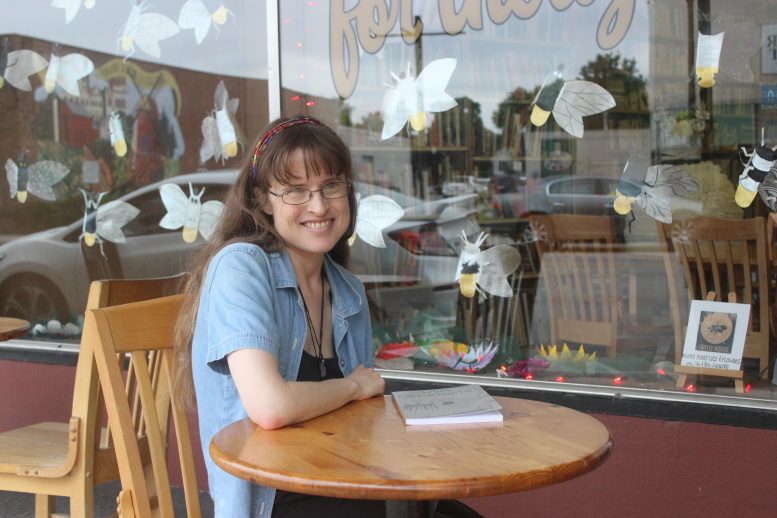By DAVID DUPONT
BG Independent News
Teresa Milbrodt has never been a fire eater… or a circus clown for that matter.
One look at her slender frame and it’s clear she’s not an aspiring sumo wrestler. She’s never trained Siberian cats as a sled team, or even sold shoes.
Teresa Milbrodt is a writer. As a writer she gets to inhabit characters who do those jobs, at least for the length of time it takes to craft one of her tight, wry, quirky short stories.
Work and relationships, with people and pets, are the focus of her book, “Work Opportunities” (Portage Press). The Bowling Green native will read for the collection of short stories Friday, June 27, at 7:30 p.m. at Grounds for Thought, 174 S. Main St., Bowling Green.
This is the latest book by self-described “fictioneer.” As with her other work, the stories are at once grounded in everyday life – the job and love struggles of her characters ring true – yet they unfold in an atmosphere of fantasy. It’s as if the people sitting around her while she’s being interviewed in Grounds for Thought were plopped into a fairy tale. Except these tales serve up no moral at the end. The happily-ever-after is elusive. Nor do they snap shut like a traditional short story.
Contemporary readers, Milbrodt said, distrust endings that come “tied up with a bow.” They seem false. “We don’t think it reflects life.”
Instead she brings her characters to the brink, when they decide to finally take action. What’s beyond the story’s final period is a precipice. Even Milbrodt may not know what lies ahead.
We don’t know what will happen if the young would-be female sumo wrestler steps in the dohyo, the wrestling ring, the violating ancient tradition. Or when a teen character’s father returns to find Aaron Burr’s foot is gone. Or whether those Siberian cats will ever get to show their abilities pulling a sled.
The stories, Milbrodt said, were written over the past decade. A few years ago, Milbrodt said, “I realized all the stories had something to do with work and a lot of them with economics and with people who were somehow making ends meet.”
She likes her short story collections to have a central core. In “Work Opportunities” it is how a job or occupation can become a passion and shape a person’s life. None of these folks, though, have high-powered corporate jobs. These are the people from smalltime circuses and shoe stores, from a local zoo and convenience store, albeit one in possession of Aaron Burr’s foot.
Milbrodt said she’ll do enough research, in the dangers of stiletto heels or circus sideshows, for the story to be plausible.
These jobs serve as the context for the characters’ emotional lives. “How do you deal with relationships you want to keep going? How do you deal with relationships that have ended but still have to be part of your life? How do you negotiate relationships that are moving into different spaces than you anticipated? And how much investment do you put in a shifting relationship?”
The “Fat Lady” from the side show has the chance to actually marry the Skeleton Man many years after their publicity stunt engagement ended. That story, “Fat Lady to Marry Skeleton Man,” explores that seemingly freakish relationship with great tenderness.
Like many of her characters these are people others would push to the margins, but Milbrodt brings them center stage and lets their humanity shine defiantly in all its complexity.
“I like the ambiguous characters, conflicted characters.”
There’s a bit of her in all her characters, though none of the stories are disguised autobiography. “You know what it’s like to feel a certain way. That’s why I say ‘emotionally autobiographical.’”
The settings are often oddly similar to where she grew up. “Dohyo” takes place in California and “Aaron Burr’s Foot” in South Carolina because of the requirements of the plot. But otherwise most are set in nameless medium-size towns in the Midwest. “Ohio is kind of my default location.”
She said an increasing concern of hers is: “How do we preserve community? How do we preserved smallness? How do we balance this? We want to keep kids here but we don’t have jobs for them.”
She and her husband, Tristan Palmgren, live in Columbia, Missouri, where she’s pursuing a doctorate in English with a focus on creative writing and disability studies. She’s at work on the novel that will be her thesis.
She’s back in town to visit her parent, Tom and Jane Milbrodt, and escape the Missouri heat and humidity.
Sitting in Grounds for Thought, where she and her husband were married 10 years ago this week, her “writer’s radar” may just very well pick up something that she can shape into another story. A writer’s work is never really done.

